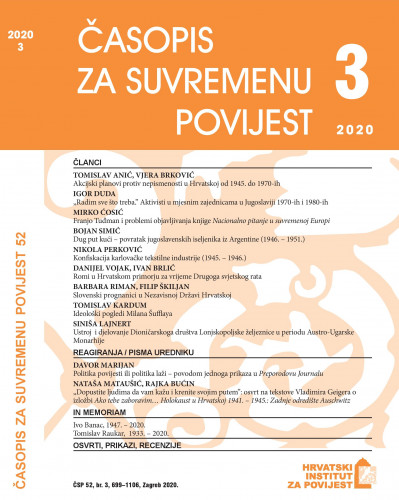U kontekstu političkih, gospodarskih i društvenih promjena sredinom XX. stoljeća sustavno se ostvaruju temeljni ciljevi Komunističke partije Jugoslavije na svim razinama te dolazi do strukturnih promjena u društvu. Zadane promjene može se pratiti i preko mjera poduzetih za smanjenje broja nepismenih, što je izravno proizlazilo iz potrebe rješavanja temeljnih društvenih i gospodarskih problema. U radu se problematizira borba protiv nepismenosti u Hrvatskoj nakon Drugoga svjetskog rata. Akcijski planovi opismenjavanja stanovništva koje su sustavno provodili državni organi pokazuju da se korjenito mijenjala slika društva. Odgojno-obrazovne teme i povijest školstva XX. stoljeća u hrvatskoj historiografiji, uz određene iznimke, neistražene su kao primjerice u historiografiji XIX. stoljeća. Autori su analizom izvora i literature uspostavili tri faze odgojno-obrazovnih promjena. U ovom će se radu pratiti problem rješavanja nepismenosti preko promjena odgojno-obrazovnoga sustava i akcijskih planova opismenjavanja od 1945. do završne faze 1974., kada je donesena odluka o osnivanju Komisije za borbu protiv nepismenosti. Namjera je ovim radom doprinijeti istraživanju povijesti obrazovanja u hrvatskoj historiografiji.; In the context of the political, economic, and social changes in the mid-20th century, a systematic implementation of the core goals of the Communist Party of Yugoslavia/ League of Communists of Yugoslavia was conducted on all levels, resulting in structural changes in society. Among other things, these changes were the result of the measures implemented in order to reduce the number of illiterates, and this was directly related to the need to resolve basic social and economic problems. In this paper, the authors examine the struggle against illiteracy in Croatia after World War II. The literacy action plans that were systematically conducted by state authorities indicate that the image of society underwent profound changes. Thus, from a bottom-up perspective, society became subject to long-lasting changes. With certain exceptions, educational topics and the history of education in the 20th century remain unresearched in Croatian historiography, especially when compared to, say, the same topics in the 19th century. Therefore, this topic represents a new beginning in research and, due to its nature, also enters the frame of social history in the second half of the 20th century. Through source and literature analysis, the authors have determined three phases of educational changes. This paper shall examine the problem of combating illiteracy through changes in the educational system and literacy action plans in the period from 1945 to 1974, when the decision to form the Commission for Combatting Illiteracy was made. The aim of this paper and this approach to the topic and problem of illiteracy through literacy action plans is to contribute to history of education research in Croatian historiography.
Sažetak

 Časopis za suvremenu povijest : 52,3(2020) / glavni i odgovorni urednik, editor-in-chief Zdravka Jelaska Marijan.
Časopis za suvremenu povijest : 52,3(2020) / glavni i odgovorni urednik, editor-in-chief Zdravka Jelaska Marijan.